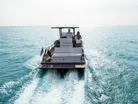Electric Boats Lead the Way in Sustainable Marine Innovation

Electric boats are transforming the marine industry with their blend of innovation and sustainability. Powered by battery-driven electric propulsion systems, these vessels offer a cleaner, quieter alternative to traditional fuel-powered boats, aligning perfectly with the global move toward greener technologies.
Market growth: Steering toward sustainability
The electric boat market has seen remarkable growth, valued at US$5bn in 2021 and expected to reach US$16.6bn by 2031. The development is driven by increasing environmental awareness, advancements in battery technology and strong government support for cleaner alternatives. Electric boats are setting new standards in marine technology and influencing the broader EV industry, with innovations in battery tech enhancing the sectors.
Halevai's leadership in electric marine innovation
Frank Heidinger, CEO and Founder of Halevai established the company in 2020 with a focus on sustainable marine transport.
The flagship model, the Model 2050, launched in 2024, features a high-efficiency trimaran hull that integrates seamlessly with existing marina charging systems, reflecting Halevai's commitment to greener boating experiences.
Efficiency of the Model 2050
"Our hull holds 'most efficient hull' status," states Frank. It offers enhanced stability and reduced drag, delivering a smooth ride across diverse marine conditions. He highlights, "The most inefficient time on a boat is transitioning from hull speed to plane speed."
With a 7-knot hull speed and 11-knot plane speed, Halevai's design minimises the gap to just 4 knots, achieving smoother acceleration and efficiency validated by advanced Computational Fluid Dynamics (CFD) technology.
Affordability of electric vs. gas boats
The Halevai Model 2050's base MSRP is US$185,000. "A full charge costs between US$8 to US$11, compared to US$75 to US$100 for a gas tank," notes Frank.
The cost difference, coupled with reduced maintenance and a lower operating cost of around 5% compared to 15-20% for traditional boats, positions the Model 2050 as an affordable, long-term investment.
'Plug In Pull Out™' charging system
The "Plug In Pull Out" slogan highlights the simplicity of charging. Frank emphasises that the Model 2050 is compatible with Level 1 and Level 2 chargers, which connect to standard outlets in most marinas or docks.
He notes that while a 110-volt charge takes 12 to 15 hours, a 240-volt outlet—like those used for household appliances—can fully charge the boat in just four and a half hours.
Model 2050's drivetrain power
Frank proudly states, "There isn't another electric boat the size and price of the Model 2050 with the same power."
Halevai has partnered with Mercury Marine, the leading supplier of outdrives in the US, ensuring consistent performance and ease of service for customers.
Halevai eR/V: Innovations for research and commercial use
Halevai collaborates with governments and institutions to develop the perfect electric water taxi or ferry for commercial applications.
"Our patented trimaran hull allows for lower resistance and more range," says Frank, highlighting the Model 2050's suitability for these markets.
Future developments and partnerships
Frank optimistically looks to the future, saying, "We look forward to developing new design models with our build partner, Lyman-Morse, and hope to continue setting the highest standard for the electric boating community."
Halevai's commitment to innovation promises to shape the future of sustainable marine transport.
Make sure you check out the latest edition of EV Magazine and also sign up to our global conference series - Sustainability LIVE 2024.
EV Magazine is a BizClik brand.


